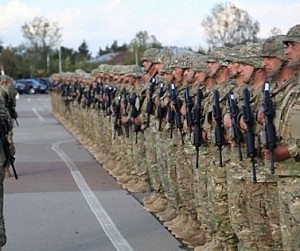TBILISI, DFWatch–Defense Minister Levan Izoria said Monday that he is reversing a decision by his predecessor Tina Khidasheli to end compulsory military service.
He made the announcement on Monday during a meeting with the media to present a report about his first 100 days on the job.
In her response, Khidasheli claimed Izoria waited until after the election with announcing the decision out of fear of losing votes.
“You just lied to people, as since the first day of my resignation, you knew for sure that you would bring back compulsory service, but you were scared of the election,” Khidasheli wrote on her Facebook page.
Khidasheli signed a decree about abolishing the compulsory service on June 27, afew days before she resigned in order to participate in the election campaign for the Republican Party.
Her decision only applied to the 25% of recruits who serve in the military. The other 75% would still be drafted. That applies to personnel in the Interior Ministry and the Prison Ministry.
Cabinet members criticized Khidasheli’s decision, and it was also unexpected for the prime minister and the president. Both said that this kind of issue needs to be discussed with the cabinet members and the Georgian National Security Council.
Levan Izoria, who was appointed as minister in July, said that he would make up his mind about this issue after consultations. Now, he says, a decision has been made that compulsory military service will be reintroduced.
“The recruits will go through comprehensive initial training and will become complete military personnel. The payment for recruits will increase to 50 laris and they will have the right to holidays,” the defense minister promised.
Khidasheli explained her decision by saying that the current form of compulsory service is unfair because it uses a person’s labor without compensating it; it forces youth to what they often do not want to, and it doesn’t bring any results for the interest of the public.
She also writes that people often find it difficult get a job and if they finally get a job it equals to death to abandon the job; but the government forces them to work for just 50 laris.
“These youths have bank loans which they cover with their new jobs, and you force them to face their debts, increased interest rate and lost jobs,” she writes.
In order to avoid compulsory service, young people often delay their studies by failing subjects in order to remain a student for many years, which shields them from being drafted.






Leave A Comment
You must be logged in to post a comment.